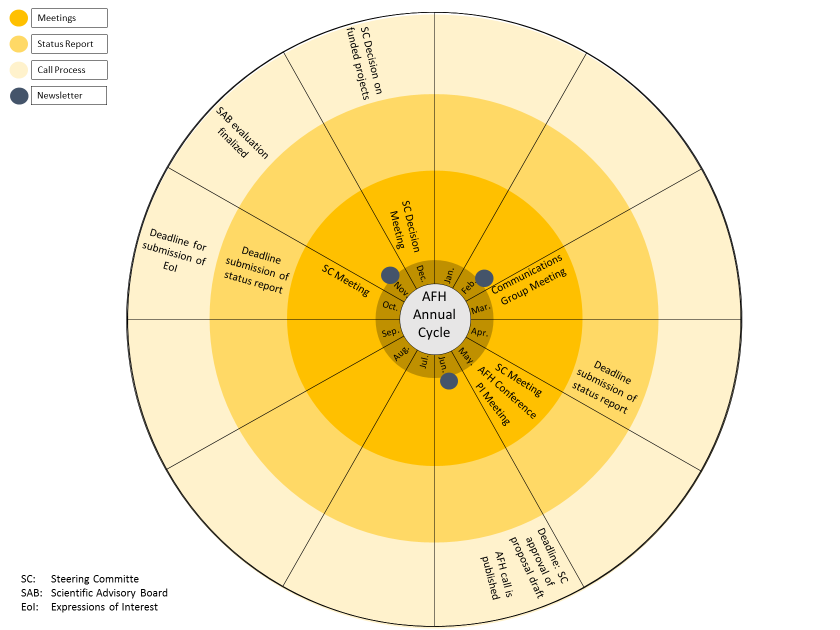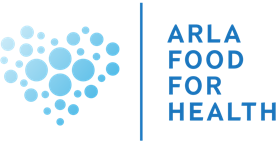Arla Food for Health Newsletter – February 2018
Publish date: 23. February 2018
Funded project 2017
This year the Steering Committee decided to fund two of the received Expressions of Interest, namely Gerrit van Hal, Copenhagen University, “Whey‐derived protein ingredients: gastro intestinal absorption, whole body utilization and gut health” and Christian Mølgaard, Copenhagen University, “OptiMilk – Optimal bone health and growth in children with proteins and vitamin D in Milk”. The remaining applicants have been informed that AFH could not support their projects.
Arla Food for Health Annual Cycle 2018
Below the Year cycle for Arla Food for health with important deadlines.

Update on existing projects
In the OmniSaM project the work with collecting data to conduct a multimodal metric to predict satiety is ongoing. The first subjects have completed the experimental study where endocrine, functional magnetic resonance imaging and behavioral measures are combined in a meal test. Data collection will continue over the year 2018. In January 2018, two BSc. students connected to OmniSaM finished their Bachelor in Chemistry Engineering from Aarhus University with Bar-bara Vad Andersen as supervisor. The thesis was entitled “The Effect of Variation in Protein to Carbohydrate Ratio on Sensory, Hedonic and Satiating Properties”, and focused on the pre-loads used in the multimodal meal study. Congratulations to Nete Rydén Pedersen and Louise Pflug Carlslund with their successful results.
The STIMMUNE project focuses on bioactive milk diets to stimulate gut immune defense in neonates born with perinatal inflammation. The dietary milk components, caseinoglycomacropeptide (CGMP) and osteopontin (OPN), and colostrum have been tested in a prenatal and neonatal pig infection models. The current results indicate multiple gut and systemic protective effects of colostrum in both two models, and several gut protective effects of CGMP and OPN including neonatal arousal, digestion, absorption and in vitro proliferative effects, in the prenatal infection model. We are currently recruiting preterm infants in China with plasma sample collection for global -omic analyses. Comparative Pediatrics and Nutrition at University of Copenhagen were hosting a STIMMUNE status meeting on 12 February 2018.
The DAIRYMAT project has now narrowed down in identifying the 4 dairy matrix structures that will be in focus for the project.
Analysis methods has been set up and the reference Cheddar cheese samples with different homogenisation processing treatments are analysed by in vitro digestion, release of free fatty acids, rheology, microstructure by confocal microscopy and solid fat content by low-field NMR measurements. Variations in milk fat globule (MFG) size distributions and proteins associated with the MFG-membrane are found as function of processing.
The work continues with analysis of chemical composition, which is aimed to be equal for protein, fat, lactose, and minerals of the dairy structures, in vitro digestion, microstructure imaging and rheology parameters. Furthermore, taste of the dairy matrices will be assayed before the in vivo postprandial study. The detailed protocol for this cross-over study is in progress and aimed to be ready in May 2018.
In MAGMAM the contract between Copenhagen University and the local university in Uganda (Makerere University) has been delayed for several months, but we expect this agreement to be signed in week 9. However, we do not expect a severe delay in the overall timeline for the project.
Update on midway evaluation (The Innovation Capability Assessment)
Based on The Innovation Capability Assessment the Steering Committee and Sponsor Group decided on some actions to further improve Arla Food for Health, which we have started to implement.
Case study published
The Innovation Board who performed The Innovation Capability Assessment has published a case study based on the evaluation of Arla Food for Health as a showcase of best practice. This is now available on their webpage.
Improved communication flows
Due to a demand for an Arla Food for Health standard presentation, Radius Kommunikation is involved in making a PowerPoint presentation, a visual identity and a logo for Arla Food for Health. The new presentation can be used for conferences. Our aim is to have the logo and final presentation completed before the Arla Food for Health conference on May 2nd and hereafter they will be available for download at the AFH website.
We have designed and distributed a survey on the quality of communication coming out of Arla Food for Health where the target group is asked to evaluate whether the communication has improved during 2017. We expect to have a result before May 2nd.
Arla Food for Health Communication
The Arla Food for Health Communication Group met on January 19th to discuss the communication strategy for AFH and to decide on specific actions and communication plans. Making sure that the funded projects communicate their results is vital for the work to make the desired impact. Communication representatives from the four entities in AFH will work with the PIs to agree on a tailormade communication plan for each project.
